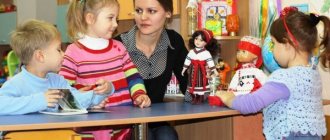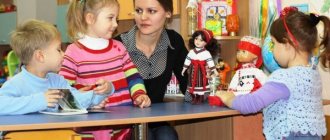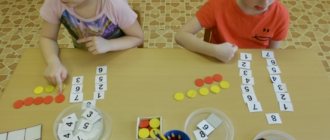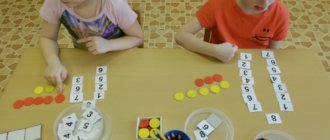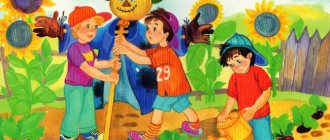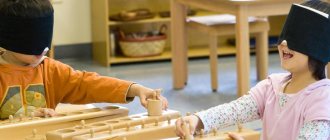Communication skills are the basis that helps a child find friends, make acquaintances and realize himself in society. When a person is isolated in his own little world, it is difficult for him to become in demand and popular. But if he has learned to convey his thoughts to others and communicate with people, he holds the key to personal success.
But this key is not given to every person at birth. The good news is that a child’s communication skills can and should be developed. And our article will tell parents how to do it correctly.
What are communication skills?
Translated from Latin, “communicative” literally means: “communicative”, “sociable”.
Communication is not a separate personality quality, but a whole set of different skills. And it is expressed in the ability to communicate with other people, the ability to build relationships with them.
Conventionally, communication skills are divided into two groups:
- skills that help a person convey his thoughts and feelings (speaking skills, self-control, self-presentation);
- skills that help to understand others (the ability to negotiate, empathize, listen and hear the interlocutor).
Talk to your child more
Children who have communication problems often don't like to talk at all. Your task in this case is to create an atmosphere in which the child would have a desire to share thoughts and insights. Many of a child's talents and abilities develop in the family. If he learns to talk openly and without embarrassment with relatives, then he will definitely not be embarrassed in front of his friends. Create family traditions that are associated with warm and trusting communication. For example, regularly tell each other about your day. What positive and negative moments it was filled with. Together, enjoy the positive events and discuss the negative side of the day. If problems arise, it is important to discuss them and find the right solution.
Why does a child need communication skills?
So as not to be left alone. To become a member of society, to be accepted by others, while remaining yourself. If a person does not know how to talk about himself, but only listen to others, he will not become an individual, he will lose his “I”.
The other side is that the child knows how to talk exclusively about himself, but does not know how to listen to others. Such a person will not be able to build quality social connections in the future or expand his social circle.
A little person acquires communication skills gradually as he grows and matures. Step by step, he learns to read non-verbal information (facial expressions, gestures, tone of voice), then he learns the first words. Growing up, he acquires the ability to listen and hear his interlocutor, put himself in his place, and perceive the shades of human relationships.
The first communication skills are formed in the family, then in kindergarten, school, and then throughout life. Therefore, the ability or inability to interact with others depends on those processes that occur from early childhood until the period of maturity.
Some children get along better with others, make contact, and find it easier to communicate with peers and adults. Others experience difficulty and discomfort. And although innate qualities should not be discounted, communication is still one of the aspects of personality development. This means that the ability to communicate can and should be developed.
To develop communication skills in a child, you need to help him master three basics:
- desire to communicate;
- knowledge of the basics of social communication;
- the actual ability to communicate.
Desire to communicate
This means that the child himself must feel the need to communicate with people around him. And this need can and should be developed. If you don't do this, there will be no progress. An adult, due to life experience, can motivate himself to communicate with others. Children don't know how to do this.
Know how to communicate
The desire to interact with others is not enough. You also need to know how exactly this is done. Young children do not know about the norms and rules of communication. Parents suggest how to resolve conflicts with peers, maintain a conversation, say hello, etc.
Ability to communicate
This point follows from the previous one, when communicative knowledge is applied in practice. The ability to communicate consists of a whole complex of practical skills:
- the ability to interest an interlocutor and attract his attention;
- goodwill, friendliness;
- the ability to accept the opinion of the interlocutor and not impose your own;
- the ability to argue information and tactfully defend one’s point of view;
- the ability to captivate your interlocutor, to interest him in your opinion and ideas;
- ability to resolve conflict situations, seek balance when resolving controversial situations.
Another important component of good communication is active listening. It is usually most difficult for choleric children. They can’t wait to tell as much as possible about themselves, their impressions, and hobbies. The interlocutor’s statements are relegated to the background.
If a child has successfully mastered these three skills, then we can say that his communication skills are truly developed.
Social and communicative education of preschool children: goals and objectives
Social communicative development of preschool children is one of the most important areas in the education of preschoolers.
These are the skills and abilities that will be useful to kindergarten students when they become adults.
IMPORTANT! The goal of this direction is the socialization of preschool children, introducing them to universal human values, social norms, traditions of the family and the state.
Within the framework of this goal, the following tasks :
- In the process of education, create conditions in which preschoolers can accept and master the values and norms of society.
- Develop children's ability to empathize, communicate kindly and interact with peers and adults.
- Help children become independent, purposeful, and learn to independently regulate their own activities.
- To form in them respect for their own family, the team in which they are located, as well as a positive attitude towards work and creativity.
- Teach children to behave safely at home, in society, and in nature. Prepare them to interact with peers.
Features of the development of communication skills in preschoolers
At each age stage, children's communication skills develop and improve.
From birth to 2 years
During this period, the child takes his first steps not only physically, but also communicatively. The social circle of children at this age is limited to mom, dad and other close relatives. Children learn to convey their needs to adults and, in turn, understand their interlocutor.
Methods for developing communication skills
The main ways to develop communication skills are exercise and play.
Before choosing activities for your child, it is useful to take note of a few recommendations:
- Do not try to use a large number of exercises or games at one time, especially with preschoolers. Their performance is low and fatigue is rapid.
- Training should be carried out when the child is in a good mood: not overtired, not hungry, does not want to sleep.
- All exercises and games will only be beneficial if the child really wants to do them. Therefore, you should not force him to take classes; it is better to conduct them when he himself expresses a desire.
Any game or exercise must be played out in such a way that children understand that interacting with each other is very important.
Games to develop communication skills
Any games to develop communication skills must be age-appropriate, that is, be accessible and understandable. If several preschool children are playing at the same time (in the yard or in the family), you need to give each of them the opportunity to participate.
It is the adult who controls the activities of the players, sets an example, explains the rules and makes sure that everyone is involved in the game. If one of the players pulled away and became shy, you need to help him return, but do it unobtrusively, gently.
- Game "Animal Choir". Any popular children's song is chosen for the game. But you need to perform it not with words, but trying to imitate the voice of different animals: “quack-quack”, “meow-meow”, “kva-kva-kva”. Each player portrays a specific animal and performs his part of the song. All the children finish singing.
- Game "Compliments". The goal of the game is to develop mutual politeness and emotional contacts. Participants should say pleasant, beautiful words to each other, trying not to repeat themselves. When giving compliments, you need to look your interlocutor in the eyes. Anyone who receives a compliment must thank the speaker in return.
- Game "Mousetrap". This game will teach you how to find a way out of difficult situations. All participants form a tight circle, in the middle of which the “mouse” hides. She must find a way out of the circle or persuade one of the participants to let her through. If the game takes place in a close company, for example, with the participation of parents, the little player can be hugged tightly and offered to free himself through persuasion.
Exercises to develop communication skills
It is better to carry them out based on clarity. That is, for work you will need a board and pictures. If several children participate in an exercise, they perform them in turns. The rest of the participants observe, and if the performer allows, they can give advice.
To develop communication skills, you can use the following exercises:
- Place cards on the board with images of people on whose faces you can track certain emotions. Next, you need to tell a short story about a specific person. For example: “This is Vasya, he is sad because his favorite toy is broken.” The presenter asks the children how they can help Vasya, the players take turns offering their options.
- Divide the board into two halves, mark one with a “+” sign, the other with a “-”. Next, the children take turns going to the board and are offered several pictures. Each participant chooses a “bad” and a “good” option. It is important that the direction of the pictures is the same, for example, a whole and a broken cup, a smiling and a crying boy. Players need to make up a short story based on the pictures.
- Collective listening to a work of art. It's better to start with small fairy tales. An adult reads it to the children, and then everyone collectively discusses the plot. Particular attention should be paid to the actions of the characters, highlighting good deeds. Negative aspects also need to be noted, together with the children, figuring out why this cannot be done.
Advice! If a small participant finds it difficult to perform any exercise, you can help him. But there is no need to complete tasks for children. You can ask leading questions or voice clues. It is better to start the exercise with the simplest elements, gradually complicating the task.
PEDAGOGICAL CONDITIONS FOR FORMING COMMUNICATION SKILLS IN PRESCHOOL CHILDREN
№17, 13.02.2019
Pedagogical Sciences
Nurieva Alesya Radievna
Safonova Maria Sergeevna
Key words: SPEECH; COMMUNICATION; PRESCHOOLER; COMMUNICATION; SKILLS; PEERS; A GAME; SPEECH; COMMUNICATION; PRESSHOOLER; COMMUNICATION; SKILLS; PEERS; GAME.
Abstract: Timely acquisition of correct speech is important for the formation of a child’s full-fledged personality, harmonious psychophysical development, and his successful education. In this regard, recently in psychology and pedagogy attention has been focused on the issue of developing communication skills in preschool children, as one of the factors in further personality development. The article reveals, defines and characterizes the criteria and levels of development of communication skills. A set of measures has been developed and tested to increase the level of development of communication skills.
The need for communication is one of the most important human needs, according to psychologists. Communication is the basic condition and the main path of human life. Only in communication and relationships with other people can a person feel and understand, and find his place in the world.
The implementation of the demands of modern life poses the task of pedagogy to purposefully prepare children from an early age for full communication in various spheres of life. In a short period of early and preschool childhood, a child masters three types of communication: - emotional communication - the first half of life; - communication based on understanding - from the second half of the year of life; - communication based on speech - from 1.5-2 years.
All the most important aspects of a child’s personality and activity, including his speech, develop through communication. Speech as a means of communication, since its action occurs at a certain stage of development of communicative activity. Its emergence and development are determined by the needs of communication and the general life of the child.
Speech arises only as a necessary and sufficient means for solving problems of communication between a child and an adult, which a preschooler encounters at a certain stage in the development of his communicative activity and arises from broader life problems for the child associated with the type of leading activity.
In communication, children of older preschool age are more oriented towards their peers than younger ones: they spend a significant part of their free time in joint games and conversations, the assessments and opinions of their comrades become important for them, they make more and more demands on each other, their behavior is trying to take into account.
In communicating with peers, the child learns to express himself, control others, and enter into various relationships. At the same time, in the process of communicating with adults, the child learns to speak and knows how to listen and understand others, and learn new knowledge. In addition, it is through communication that a child learns his own images from an adult, so parents and teachers bear special responsibility for building interaction.
Based on the considered features of the development of communication in children of senior preschool age, the development of communication skills in a child will occur more effectively if the necessary conditions are created for this.
To develop communication skills in preschool children, it is necessary to create pedagogical conditions, including: - a systematic approach in all types of communicative activities of preschool children; — interaction of various actors, trends and technologies in order to achieve the complete formation of communication skills of preschoolers; — social situation of the child’s development; — the emerging need to communicate with adults and peers; — formation of a positive attitude towards peers in the process of organizing a role-playing game.
Thus, it should be noted that the development of communication skills does not occur naturally, but with the help of special techniques that involve creating special conditions. This problem can only be solved if it is possible to create situations in the children's environment that require children to make an independent, conscious choice of the type of action and level of activity, values and goals, motives and behavior, and to try a variety of social circles that require creative expression of both the group and and individual communication skills.
To study the development of communication skills in children of senior preschool age, a sample of 24 people was formed who attend one kindergarten group. The ratio of boys and girls in the group was approximately equal.
To diagnose the communication skills of preschool children, criteria were developed: the ability to negotiate, the ability to take initiative in making contacts, the ability to conduct a dialogue, the use of verbal and non-verbal means of communication, overcoming conflicts, the emotional perception of a communication partner, the ability to justify one’s point of view.
To study the features of the development of communication skills of preschool children at the ascertaining stage, the observation method was used. The experimental work consists of studying the effectiveness of the development of communication skills in preschool children in a preschool educational institution before and after working with them.
It was found that at the ascertaining stage of the experiment, preschoolers are able to use verbal and non-verbal means of communication (62.5%), this could be observed during role-playing games such as “Shop”, “Mothers and Daughters”.
Overcome conflicts (66.7%). As it turned out, many children in the group are able to overcome conflicts that arise during play activities and during classes. It is least difficult for a preschooler to justify his point of view (16.7%), and it is difficult for children to explain why he thinks this way and thinks this way in a given situation, how he would act in this situation and why exactly that way. Negotiate (20.8%), this factor was most often encountered when children could not agree among themselves how they would play now; one boy wanted to play with cars, and the other with hide and seek, but they both wanted to play together. The result is that one of the boys did not accept the fact of the other and caused a scandal. The ability to conduct dialogue (25%), this criterion could be observed in classes, when the teacher sat the children in a circle and began to have a conversation with them on the topic of the lesson. The children could not conduct a dialogue with the teacher; the children’s answers to questions were in the form of “yes” and “no”.
Thus, the results of observations of relationships between children indicate that the same environment is not the same for different children, each of them already has experience of emotional relationships with close adults, not always, unfortunately, positive, as well as their own experience of activities with adults and peers.
Observation showed that, regardless of the nature of the child’s communication with peers, the child cannot independently resolve conflicts, which does not allow him to fully develop as an individual. Based on observation of children, we can conclude that the current problem in raising children is to teach them the ability to communicate effectively, reduce aggressive behavioral tendencies, eliminate defensive reactions, isolation, introduce them into group life, and accumulate experience of positive interaction.
The child’s position in the children’s team, the success or failure of his socialization largely depend on how the friendship between children will develop. And joint gaming activities can become one of the factors in solving these problems.
The research conducted during the experiment proved that an important condition for the development of communication skills in preschool children is the development of the ability to negotiate, take initiative in establishing contacts, create a friendly atmosphere of mutual assistance, conduct a dialogue, and justify one’s point of view. The complex nature of pedagogical work requires constant consideration of the interaction of communication skills in the dynamics of the child’s continuous development. As a result, there is a joint stimulation of the development of communication skills, as well as the prevention and correction of their violations.
The second stage of the study is devoted to the formative experiment. At this stage, a comprehensive program was developed and implemented from the point of view of the effectiveness of the process of developing communication skills in children of primary preschool age. The research hypothesis was tested. During pedagogical activity, the leading type of activity for this age in preschool age is stimulated - play activity.
Games that develop communication skills help a child learn to understand other people, correctly express emotions, help children develop a sense of tolerance for other lifestyles, opinions, behavior, etc.
In the process of developing communication skills, the children were offered the game “Magic Wand”. The game is aimed at developing communication skills and the ability to understand the feelings of another. The children also played the game “Guess who’s calling?”. This is a calm game that develops communication skills and memory. Can be used when introducing children.
To form a liberated child, the game “Tasks for names” was used. The presenter took turns calling the names of the children and voicing the tasks for each name.
The control stage was carried out according to the methods of the ascertaining stage. It was found that the majority of preschoolers are able to show patience with the shortcomings of others (more tolerant), are able to take initiative in establishing contacts, are able to create a friendly atmosphere of mutual assistance, and are able to conduct dialogue. It was found that after the formation of the communicative qualities of younger preschoolers, the assessment signs characterizing the communicative qualities of children significantly improved. Younger preschoolers have improved their ability to negotiate (from 20% to 37%). They learned to take the initiative in making contacts (from 41% to 87%). The use of verbal and non-verbal means of communication has improved (from 62% to 100%).
An experimental study of the level of development of communication skills in younger preschoolers showed that before the experimental work, younger preschoolers had a low level of development of communication skills, and at the installation stage of the experiment, younger preschoolers can only take the initiative in establishing contacts and creating a friendly atmosphere of mutual assistance, but they need to learn how to use yourself, negotiate, come to an agreement and justify your point of view.
After carrying out activities to develop communication skills in younger preschoolers, a high level of development of communication skills was revealed, the majority of younger preschoolers learned to be patient with the shortcomings of others (became tolerant), learned to take initiative in making contacts, became more capable of creating a friendly atmosphere of mutual assistance, learned to conduct dialogue .
The experimental activities of the teacher help the child solve mental problems, difficulties of communication and mutual understanding. It creates conditions for a preschooler to gain personal experience and thereby facilitates the development of communicative skills. The children who participated in the experiment become a little different. The child, imagining, puts himself in the place of the good characters in the game and thus learns the positive beginning that the good characters carry. Images become the standard of imitation, the driver of behavior.
We see that the results have improved. The improvement in the indicators of the experimental group, and to a greater extent than in the ascertaining experiment, gives us reason to consider the hypothesis that we put forward at the beginning of the work to be confirmed.
How to develop your child's communication skills in everyday life
In order for a child to learn, and most importantly, to want to communicate with people around him, from childhood he needs to be provided with:
- psychological comfort;
- the opportunity to communicate with people of different ages;
- support for parents and teachers in organizing communication in the group.
In the first years of a person’s life, communication skills are shaped or not shaped by parents and family members. It is they who have the most important role - to teach the child to communicate. You don't have to be a teacher to do this. It is enough to take note of a few tips and effective techniques.
Play phone
A simple and fun game will help your child develop communication and listening skills. Take an old rotary phone or toy phone and imagine that you are calling each other. Create different situations and unusual dialogues. This could be a conversation between two friends, a dialogue between a seller and buyers, a doctor and a patient, and many other options. This skill will be useful to the child in the future. After all, even many adults are embarrassed to talk on the phone and don’t know what phrases to use to communicate. Develop this skill in your child from childhood!
The role of the family in the development of communication skills in a child
Sometimes parents make a mistake in developing the communication skills of their son or daughter. But dads and moms themselves often don’t even know about it.
Here are some examples of erroneous patterns of behavior in adult-child relationships that make it difficult to develop communication skills:
- "The pride of the family." Almost all parents consider their children to be the best and wonderful in everything. But the boundaries between unconditional love and permissiveness collapse when the child is recognized as exceptional, superior to his peers in everything. Every little person’s wish is fulfilled, all his mistakes and mistakes are forgiven, not discussed or analyzed. Such children grow up to be selfish, spoiled beyond measure.
- "Favorite." Often appears in large families. The attitude towards it is almost the same as with the “Pride of the Family” model. But only in the case of a pet, the child is singled out by only one family member. The other children feel this acutely, and relationships between brothers and sisters become envious and negative.
- "Cinderella". Another typical behavior pattern for large families. From childhood, the child is assigned a secondary role. His whole life is subordinated to his brother or sister, whom his parents, for some reason, consider more successful and beloved. “Cinderella” is forced to look after the younger one or please the older one. The result is envy and an inferiority complex.
- "Forever guilty." Such a child only causes irritation to other family members. It is he who is the cause of all troubles and is to blame for everything, even for what he did not do. Throughout childhood, a little person is terrified of punishment, of parents’ displeasure, lives in eternal fear, and becomes an outcast.
- "Good girl" (boy). From birth, this child absorbed the concepts of “good”, “bad”, “decent” and “indecent”. His whole life is subject to a whole set of rules. The opinions and interests of such children are often ignored. For parents, only one thing is important - to let others understand: the child was raised conscientiously. Growing up, a person with an excellent student complex may, on principle, commit indecent and immoral acts.
- "Problem child." Too noisy, too mischievous, too active. He does not know how and does not want to hear others; pleas, persuasion and punishment do not work on him. Often this model of behavior is due to the fact that parents do not pay enough attention to raising the child, are unable or do not want to find a common language with him.
- "Crystal Vase". Children who have experienced a serious shock, trauma or serious illness often grow up too fragile, vulnerable and protected. Those close to him protect him from everything that, in their opinion, could harm him. Such a child grows up without initiative, in the belief that everyone owes him, constantly waiting for concessions.
Bibliography
- Arushanova A. G: Development of communication abilities of a preschooler - Publisher: Sfera, 2012 -80 p.
- Emelyanova N.P., Rumyantseva M.V / N.P Emelyanova, M.V Rumyantseva Formation of communication skills of preschoolers in the process of communication - Publisher: Perm Mercury, 2015 - 125 p.
- How to teach children to communicate: A guide for child psychologists and speech therapists, St. Petersburg: SOYUZ, 2004. - 352 p.
- Kravtsova E., Purtova T. Teach children to communicate // Preschool education. - 1995. - No. 10.
- Education and training program in kindergarten / Ed. M.A. Vasilyeva, V.V. Gerbova, T.S. Komarova 3rd ed., revised. and additional - M.: Mozaika-Sintez, 2005. - 208 p.
Possible impairment of communication skills
Communication skills are not always developed as quickly and efficiently as parents would like. There are several main communication problems in children:
- Painful mental state: anxiety, nervousness, rapid mood swings, increased excitability.
- Emotional deafness: the child does not perceive the emotions of people around him.
- Complete ignorance of others, isolation in one’s own world.
Problems in the development of communication skills usually occur in children who have the following character traits:
- Shyness, excessive isolation: such guys are usually silent, so they do not attract the children around them.
- Aggressiveness: A person who hurts others is not popular with their peers.
- Selfishness: children do not know how to empathize with others, and accordingly, they are treated the same way.
- Passivity: the child does not have his own opinion, is not able to come up with exciting activities for his peers, and does not participate in group games.
Learn to listen to each other
Listening is one of the most important skills that will help your child develop communication skills. If a child begins to share thoughts, but you do not listen to him or pretend to listen, he will immediately feel it. As soon as the understanding comes that he is telling his thoughts in vain, the child will stop sharing. Trust arises between people when everyone is confident that they are heard and understood. For families, this rule is no exception. Respect your child’s opinion, listen carefully and value him. If the child does not listen to you, explain your ideas and expectations in a soft and calm tone. Reflect together on the importance of listening and hearing others.
